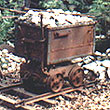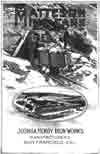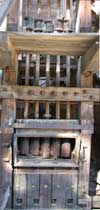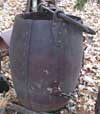 |
Home:
About This
Site:
Wildcat Miners
Safire
Gold Mine
Wildcat Mines:
Overview
The typical mine.
Equipment used.
Photos
Joshua Hendy:
Joshua Hendy Iron
Works, SF.
Photos:
Mine cars
Ore cars
Skip cars
Ore buckets
Water buckets
Other Equipment
Links:
Mines of the Sierras
Kennedy Gold Mine
Amador Sawmill & Mining Assn.
Wildcat
Mines of the Mother Lode
Ore Cars and Mining Equipment
|
A Short History of the Joshua Hendy
Iron Works: After a year Joshua had saved enough money for a small business venture, and in 1852 he built a sawmill at Salt Point on the coast above Fort Ross. In the early days of sawmilling in California the mills were very small labor intensive operations, usually consisting of a small steam engine and a carriage with a reciprocating flat bladed saw not much bigger that a 2 man hand saw. The mills could not cut much in a day, but lumber was scarce so profits were high. Over time Joshua built and sold several mills, and seeing that there was a demand for milling machinery, finally decided he could make more money building the sawmill machinery rather than cutting timber. Thus, in 1855 he started the Joshua Hendy Machine Works at 49-51 Fremont St. in San Francisco.
Hendy’s original machine works began then, by strictly building the
components for small sawmills, but Joshua was always looking for ways
to
Solving this problem led to Joshua Hendy’s greatest accomplishment:
In 1874 he invented, patented and started producing the Challenge
Automatic Ore Feeder for stamp mills. This feeder, which ran off
the main shaft of the mill automatically opened and closed the hopper
to feed a continuous and consistent amount of ore to the stamp heads,
thus maximizing production and minimizing damage. Everyone was
happy—the mine owners and the workers—and now Joshua Hendy had a
source of profits to turn his In 1882 Joshua incorporated the
business with his nephew Samuel J. Hendy as one of the officers.
Joshua’s title was now manager, with Samuel as President of the firm. Samuel became active in expanding the business and during the 1880’s
the company built ore concentrators,
On
October 19, 1891 Joshua Hendy died at the age of 74. Samuel Hendy took
over the business, and expanded production in casting, forging and
riveting iron. The Machine Works continued to expand its
manufacturing, producing ever larger and more modern mining equipment. When WWII hit, and the mines were shut down by government decree, the Iron Works built ship components and ship engines for the war effort. After the war, the mining industry was finally starting to wane, so the Iron Works continued by building marine engines. In 1956 the Joshua Hendy Iron Works was sold to Westinghouse Corp., who continued to use it for a manufacturing plant, and still has a facility there in Sunnyvale to this day. The Joshua Hendy Iron Works was a major contributor to the development of the California mining industry, and for over 100 years supplied equipment to the mines of the West, both large and small. Its legacy can be seen in museums and back yards all over California: Fascinating old ore cars, ore crushers, stamp mills, and all kinds of “old mining junk” are collected by people interested in the history of the Old West.
|
 Like to tell me of something you have? If you have an interesting ore car, or other items from 1849 to the early 1900's you think might have been used in mining, or perhaps some bits of history, documents or photos, that you are willing to share, let me know:
| ||||






